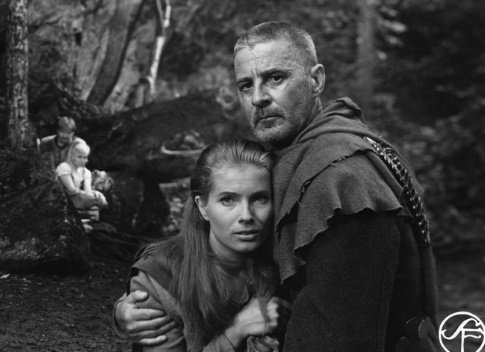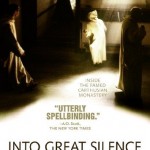Wiesel is in a Nazi concentration camp when a young boy is tortured and sentenced to death by hanging. The entire camp is summoned to watch the execution. As many horrible things as they have seen already, this seems to be the worst of all: barbarity being shown to a child. Even worse, the two adults hung with the child die quickly, but the child, being light in weight, hangs tormented for a half an hour while the life is strangled out of him. The prisoners are forced to march past the face of this suffering child, to look him in the eyes as he agonizes. Behind Wiesel, a man cries out, “Where is God now?” Wiesel says,
And I heard a voice within me answer him:
“Where is He? Here He is–He is hanging here on this gallows.” (1)
I think it’s pretty clear that Wiesel means that he believes God is, in fact, dead: either God is powerless or he doesn’t care (and therefore Wiesel regards him as “dead to me”). But I have always thought there is a secondary meaning to this story, a meaning that Wiesel does not even see himself: that the true meaning of Christianity is that God enters into our sufferings rather than standing aloof from them. When we feel most forsaken by God, he is most entering into our human experience with us. This is what is seen in the cross: Christ mysteriously uniting himself with our sufferings, yielding to them so that in some way he could ultimately heal us from the pain of this broken world. And so, Christ was in fact hanging in that gallows, present in that suffering child, united to him in his suffering.

There is one final character I want to mention: the young, silent maiden (Gunnel Lindblom). She suffers much and says not a word through nearly the entire movie. (Like Death embodies our ultimate fear, she embodies the silence of God.) But she says a great deal with her face, with her eyes.
The squire rescues her from attempted rape and then takes her as his wife–no consent, no care for her as a person, only concern for the meeting of his own needs (like cooking and cleaning). She goes with him, disrespected, unloved. Because she is with the squire, she is part of the knight’s larger cohort. And so when the knight finally reaches his home after a long absence and greets his long-suffering wife, the silent maiden is present.
When the girl and her cohorts gather for dinner, they hear a visitor approach and knock on the gate. We watch her face, filled with dread. Bergman works with shadows and with her silent expression as she watches the doorway. We feel her apprehension, and then we see that she is right to fear: Death has arrived. And yet, in the closing moments of the film, she utters her only words in the entire film: “It is finished.”
What can Bergman mean by this clear reference to the crucifixion? As in Wiesel’s narrative, I think these words can be taken one of two ways. They can be a sad declaration that God is dead, or they can be a hopeful reference to what Christ accomplished on the cross and to the ultimate victory over death to come. Christ has entered into our sufferings with us, uniting himself with them. Christ will set us free from this suffering in the resurrection to come. There is hope, after all. He has accomplished all; we need not flagellate, beseech, or despair. We will know the wonder of new creation one day.
There is so much more in this film that I could talk about. I think of all the films so far, it is the one I most want to return to and reflect on. It made me ache, and it gave me hope too, especially in its beautiful, redemptive closing film.
Which character did you most relate to in this film?
How do you deal with the inescapable reality of death that we all must face?
——————-
Community discussion guidelines:
Because this is a Christian blog, the things I’m talking about will obviously be topics that people feel strongly about in one direction or another. Please keep in mind that this is a place for substantive, respectful, constructive conversation. All perspectives are welcome to discuss here as long as all can treat each other with kindness and respect. Please ignore trolls, refuse to engage in personal attacks, try not to derail the conversation into divisive rabbit trails, and observe the comment policy listed on the right side of the page. Comments that violate these guidelines may be deleted. Vulgar remarks may result in immediate blacklisting. For those who clearly violate these policies repeatedly, my policy is to issue a warning which, if not regarded, may lead to blacklisting. This is not about censorship, but about creating a healthy, respectful environment for discussion.
P.S. Please also note that I am not a scientist, but a person with expertise in theology and the arts. While I am very interested in the relationship between science and faith, I do not believe I personally will be able to adequately address the many questions that inevitably come up related to science and religion. I encourage you to seek out the writings of theistic or Christian scientists to help with those discussions.
———————-
For more on the hiddenness of God, check out my review of Tony Kriz’s book, Aloof.
Image notes:
Still of Max von Sydow and Bengt Ekerot in The Seventh Seal, © 1957 – Svensk Filmindustri. Source: IMDB.com.
Still of Bengt Ekerot, Max von Sydow, © 1957 – Svensk Filmindustri. Source: IMDB.com.
Still of Gunnar Bjornstrand and Gunnel Lindblom, © 1957 – Svensk Filmindustri. Source: IMDB.com.
Endnotes:
(1) Elie Wiesel, Night, New York: Bantam Books, 1960, 60-62.












